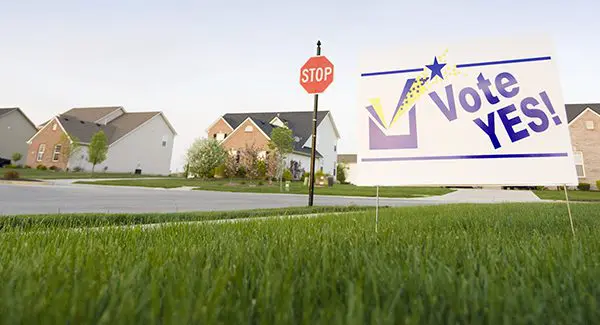- Community Associations, Board Member 101, Seasonal and Holidays
- Wisconsin, Indiana, Illinois, Florida
Condominiums, homeowner (HOA), and townhome associations can choose to regulate signage in their communities. This can include posters, flags, banners, holiday decorations, and other displays. For example:
- Commercial signage can be prohibited on homeowner and unit owner property.
- The amount of time a “For Sale” sign can be displayed in front of a property can be addressed in the association’s rules and bylaws.
- Owners may fly flags on flagpoles located near their homes and/or units if they adhere to community rules regarding location and size.
During election season, board members and property managers are likely to notice political lawn signs popping up in and around their association along with political signs being displayed on front lawns along with windows and balconies.
Association leaders should communicate to residents that the goal is not to restrict the freedom to express political views. Rather, the association is trying to cultivate a community-wide understanding of the relevant guidelines that are in place to prevent disputes.
Below are seven best practices to reference when discussing political signage policy.
1. Common areas: Consider common areas neutral zones. Common areas are maintained by the Association. Accordingly, the Board may ban political signs in lobbies, business centers, gyms, laundry rooms, elevators, recreation areas, and any other shared spaces. Civic engagement postings on bulletin boards may be allowed if they lack a bias. For example, a calendar reminder that election day is approaching and encouraging everyone to get out and vote.
2. Design: To avoid eyesores, Associations may put forth some rules about the types of signs that owners may display. Handwritten posters and signs with flashing lights could be considered violations of signage regulations.
3. Size: Signs that are too large can be disruptive and potentially dangerous. While it may be highly unusual for a homeowner to mount a billboard on their roof, having a rule about appropriate sign dimensions will prevent this from becoming an issue.
4. Number of signs: The Board may determine that one sign per candidate should be enough, especially for a smaller front lawn. Consequently, if a homeowner who is especially enthusiastic about a candidate decorates their lawn with a flock of signs to demonstrate their support, rules that stipulate a specific amount of signs can keep the displays reasonable.
5. Location: Some locations are unsafe to post signs. For example, homeowners in an HOA must be aware that posting signs on utility poles and roofs is unsafe. Owners should consider a different location such as their window, front door, lawn, or balcony (if permitted by the governing documents). Additionally, if your Association is planning a construction project, notify the homeowners and block off the area so that they can remove signs before work begins.
6. Sign removal: Once the polls close on Election Day, the Association may determine it is time to remove political signs. Even if a candidate will be up for reelection in the future, owners should not be permitted to keep political signs up all year round. Set a clear time frame and let homeowners know when they may put up their signs and when they must remove them.
7. Appropriateness: Political signs with offensive language or explicit imagery are often intended to stoke tension. In an Association, this can lead to a variety of issues, including disagreements between neighbors that must be settled by the board. It is wise to avoid the provocation by banning signs of this nature and limiting political signage to official lawn signs offered by the candidate’s campaign with only the candidate’s name, slogan, and the position for which they are running for office.
Adopting Rules and Regulations for Political Signs in Community Associations
To draft fair rules, an association must understand local and state legislation concerning the display of political signs. An attorney can offer a comprehensive interpretation of these laws as they apply to the community.
Board members and property managers should consider adopting rules to address political signage before problems arise in the community.
When the rules and violation procedures are reasonable and clearly communicated, homeowners can endorse their chosen candidates and showcase pride in their beliefs in a respectful and safe manner. Working with legal counsel to develop and implement these rules can help facilitate a manageable election season.
Legal Resource
If your condominium, homeowner, or townhome community association has questions about political sign and sign policies, do not hesitate to contact our law firm.
Please call 855-537-0500 or visit www.ksnlaw.com.
Since 1983, KSN has been a legal resource for condominium, homeowner, and townhome associations. Additionally, we represent clients in real estate transactions, collections, landlord/tenant issues, and property tax appeals. We represent thousands of clients and community associations throughout the US with offices in several states including Florida, Illinois, Indiana, and Wisconsin.
Please note the material contained in this article is for educational and informational purposes only and does not constitute legal advice. No attorney-client relationship is established by your review or receipt of the information contained in this article. You should not act on the information discussed in this article without first obtaining legal advice from an attorney duly licensed to practice law in your State. While KSN has made every effort to include up-to-date information in this article, the law can change quickly. Accordingly, please understand that information discussed in this article may not yet reflect the most recent legal developments. Material is not guaranteed to be correct, complete, or up to date. KSN reserves the right to revise or update the information and statements of law discussed in the article law at any time, without notice, and disclaims any liability for your use of information or statements of law discussed on the article, or the accessibility of the article generally. This article may be considered advertising in some jurisdictions under applicable law/s and/or ethical rules/regulations. © 2024 Kovitz Shifrin Nesbit, A Professional Corporation.



